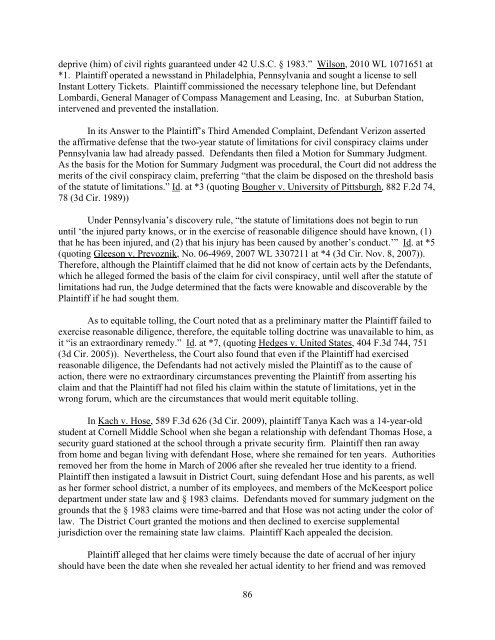2012 PROFESSIONAL LIABILITY UPDATE - Eckert Seamans
2012 PROFESSIONAL LIABILITY UPDATE - Eckert Seamans
2012 PROFESSIONAL LIABILITY UPDATE - Eckert Seamans
Create successful ePaper yourself
Turn your PDF publications into a flip-book with our unique Google optimized e-Paper software.
deprive (him) of civil rights guaranteed under 42 U.S.C. § 1983.” Wilson, 2010 WL 1071651 at*1. Plaintiff operated a newsstand in Philadelphia, Pennsylvania and sought a license to sellInstant Lottery Tickets. Plaintiff commissioned the necessary telephone line, but DefendantLombardi, General Manager of Compass Management and Leasing, Inc. at Suburban Station,intervened and prevented the installation.In its Answer to the Plaintiff’s Third Amended Complaint, Defendant Verizon assertedthe affirmative defense that the two-year statute of limitations for civil conspiracy claims underPennsylvania law had already passed. Defendants then filed a Motion for Summary Judgment.As the basis for the Motion for Summary Judgment was procedural, the Court did not address themerits of the civil conspiracy claim, preferring “that the claim be disposed on the threshold basisof the statute of limitations.” Id. at *3 (quoting Bougher v. University of Pittsburgh, 882 F.2d 74,78 (3d Cir. 1989))Under Pennsylvania’s discovery rule, “the statute of limitations does not begin to rununtil ‘the injured party knows, or in the exercise of reasonable diligence should have known, (1)that he has been injured, and (2) that his injury has been caused by another’s conduct.’” Id. at *5(quoting Gleeson v. Prevoznik, No. 06-4969, 2007 WL 3307211 at *4 (3d Cir. Nov. 8, 2007)).Therefore, although the Plaintiff claimed that he did not know of certain acts by the Defendants,which he alleged formed the basis of the claim for civil conspiracy, until well after the statute oflimitations had run, the Judge determined that the facts were knowable and discoverable by thePlaintiff if he had sought them.As to equitable tolling, the Court noted that as a preliminary matter the Plaintiff failed toexercise reasonable diligence, therefore, the equitable tolling doctrine was unavailable to him, asit “is an extraordinary remedy.” Id. at *7, (quoting Hedges v. United States, 404 F.3d 744, 751(3d Cir. 2005)). Nevertheless, the Court also found that even if the Plaintiff had exercisedreasonable diligence, the Defendants had not actively misled the Plaintiff as to the cause ofaction, there were no extraordinary circumstances preventing the Plaintiff from asserting hisclaim and that the Plaintiff had not filed his claim within the statute of limitations, yet in thewrong forum, which are the circumstances that would merit equitable tolling.In Kach v. Hose, 589 F.3d 626 (3d Cir. 2009), plaintiff Tanya Kach was a 14-year-oldstudent at Cornell Middle School when she began a relationship with defendant Thomas Hose, asecurity guard stationed at the school through a private security firm. Plaintiff then ran awayfrom home and began living with defendant Hose, where she remained for ten years. Authoritiesremoved her from the home in March of 2006 after she revealed her true identity to a friend.Plaintiff then instigated a lawsuit in District Court, suing defendant Hose and his parents, as wellas her former school district, a number of its employees, and members of the McKeesport policedepartment under state law and § 1983 claims. Defendants moved for summary judgment on thegrounds that the § 1983 claims were time-barred and that Hose was not acting under the color oflaw. The District Court granted the motions and then declined to exercise supplementaljurisdiction over the remaining state law claims. Plaintiff Kach appealed the decision.Plaintiff alleged that her claims were timely because the date of accrual of her injuryshould have been the date when she revealed her actual identity to her friend and was removed86









